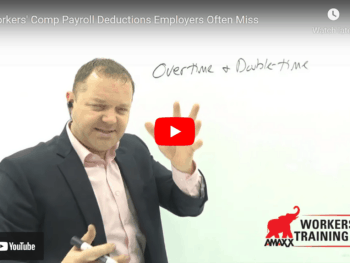It is not easy being an adjuster – worried claimants, demanding plaintiff attorneys, state forms, overly concerned employers, totally unconcerned employers, constant phone calls, tons of emails, mediations and hearings, medical providers who do not report, and medical providers billing above fee schedule all make for a stressful job with too many things to do. In such an environment, it is easy to make mistakes – mistakes that cost the insurer money. These costs are passed on to the employer in the form of higher workers compensation premiums.
Click Link to Access Free PDF Download
“Workers’ Comp Claims Review Checklist: 9 Must-Have, Serious-Impact Elements”
8 costly mistakes the adjuster can make:
- Failing to Investigate
It is way too easy for the adjuster to rationalize that if the employer reported the work comp claim, then it must be compensable. Monday morning claims (that usually happen away from work over the weekend) and claims that were not reported when they occurred are two of the most common types of work comp claims that need to be thoroughly investigated. But often there is no investigation. The failure to investigate results in payment of work comp claims that were not owed and should not have been paid.
-
Not Recognizing Subrogation
Work comp adjusters are trained in workers compensation claim handling. The work comp adjuster is usually not trained to handle liability claims and therefore will often not recognize a third-party liability situation where there is a right of recovery from another party. Every work comp adjuster should learn to ask, “What caused the injury?” and, “Was anybody else involved?” This is such an issue that some insurers have set up a separate subrogation department with staff trained to recognize liability situations and opportunities for recovery of the amount paid on the workers compensation claim.
-
Letting the Defense Attorney do the Adjuster’s Job
When the employee’s attorney files for a hearing or a mediation and the adjuster has not properly investigated the claim or does not have the claim file properly organized, defense attorneys and their paralegals will not have a word of complaint – they will simply charge their hourly rate. If the claimant’s recorded statement was never taken, no problem, they will take a deposition. If medical records are not organized, they will be put into order by whoever the treating physician was or by the chronological occurrence date. Of course, the paralegal or junior partner, who does what the adjuster should have done, will bill the insurer for time spent doing the adjuster’s job.
-
Not Reading the Medical Reports
A work comp adjuster will often scan the treating physician’s report but skip reading the diagnostic records, nurse’s notes, and various other additional documentation, especially in long, complicated cases with extensive medical information. This can be a costly mistake because buried deep in the medical documents will be information on pre-existing medical conditions or intervening causes – such as another accident. This information will change who is responsible for medical care and the amount of time an employee is away from work.
-
Ignoring Unofficial Information
The employee with the “severe back injury” is seen at the bowling alley by one of his co-workers. The co-worker tells a supervisor, who tells the work comp coordinator who tells the adjuster. The adjuster has read the medical report in which the claimant told the orthopedic doctor he could not bend over. The adjuster dismisses the information from work comp coordinator as gossip or hearsay and has “too much other work to be chasing rumors.” The claimant stays off work and perfects his bowling game while the adjuster continues to pay medical bills and weekly indemnity checks.
-
Failing to Direct the Defense Attorney
Often the overworked adjuster will give the claim to the defense attorney and say, “You handle it.” The proper course of action is for the adjuster to work in partnership with the defense attorney. In this situation the adjuster advises the defense attorney on when to litigate and when to settle. Many defense attorneys will go through the motions of depositions and hearings, and after months or years recommend the claim be settled. The adjuster should have discussed the claim early on with the defense attorney and instructed the defense attorney to defend or settle the claim. Too often unnecessary legal cost is incurred because the adjuster did not specify a course of action on the claim.
-
Not Utilizing Medical Case Management
Different insurers and different third-party administrators have varying guidelines on when the adjuster should utilize medical case management. Neither the extreme of using a nurse case manager on every work comp claim (unless a senior nurse reviewer is utilized on all claims) nor the extreme of never utilizing medical management should be the adjuster’s norm. The wise adjuster will save the insurer money by bringing in a nurse case manager on every surgical intervention, every compound fracture, and every hospitalization. When the adjuster does not have medical management involved in the file, the medical providers practicing defense medicine will have optional medical procedures performed that would have been avoided with a nurse case manager controlling the medical care.
-
Working on Autopilot
It takes a minute of the adjuster’s time each week to verify employee’s medical treatment and return-to-work status. It is easy to put indemnity checks on autopilot –they are computer issued each week without the adjuster’s approval. What often happens is the employee returns to work while the indemnity checks continue to go out. Some honest employees will return the overpaid indemnity benefit, but many will keep the extra money rationalizing it is for their pain or inconvenience. Other examples of autopilot on the claim file is placing the claim on a “long diary,” with the adjuster figuring everything will be resolved by the time the adjuster sees the file again on their diary (calendar).
If you see your workers compensation adjuster making any of these mistakes, politely bring it to their attention. Advise the adjuster not to allow an insurer to make unnecessary payments on your claims.
Author Rebecca Shafer, JD, President of Amaxx Risks Solutions, Inc. is a national expert in the field of workers compensation. She is a writer, speaker, and website publisher. Her expertise is working with employers to reduce workers compensation costs, and her clients include airlines, healthcare, printing, publishing, pharmaceuticals, retail, hospitality, and manufacturing. See www.LowerWC.com for more information. Contact: RShafer@ReduceYourWorkersComp.com.
WORK COMP CALCULATOR: http://www.LowerWC.com/calculator.php
MODIFIED DUTY CALCULATOR: http://www.LowerWC.com/transitional-duty-cost-calculator.php
WC GROUP: http://www.linkedin.com/groups?homeNewMember=&gid=1922050/
SUBSCRIBE: Workers Comp Resource Center Newsletter
Do not use this information without independent verification. All state laws vary. You should consult with your insurance broker or agent about workers comp issues.
©2011 Amaxx Risk Solutions, Inc. All rights reserved under International Copyright Law. If you would like permission to reprint this material, contact Info@ReduceYourWorkersComp.com.












